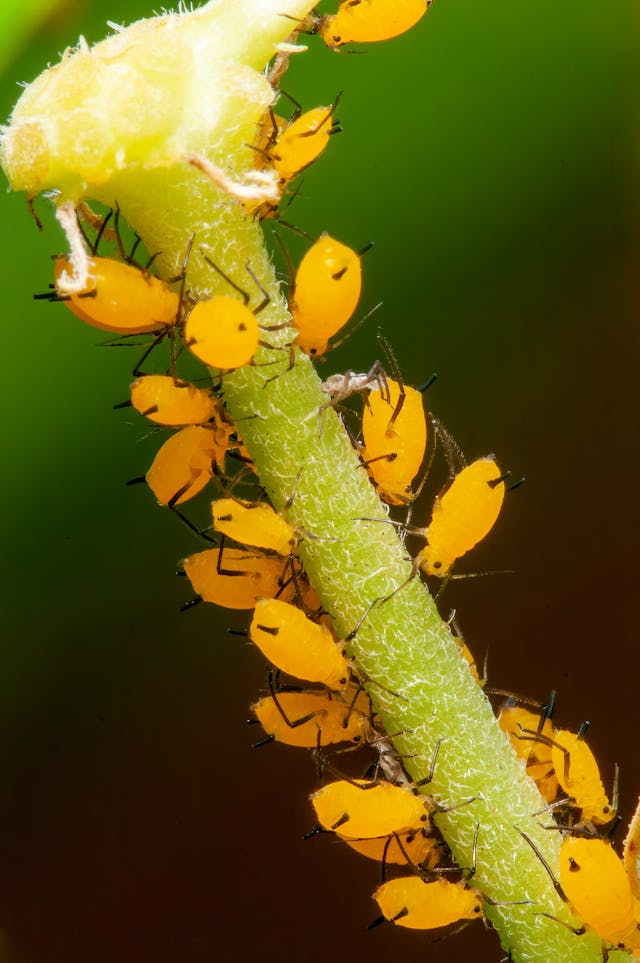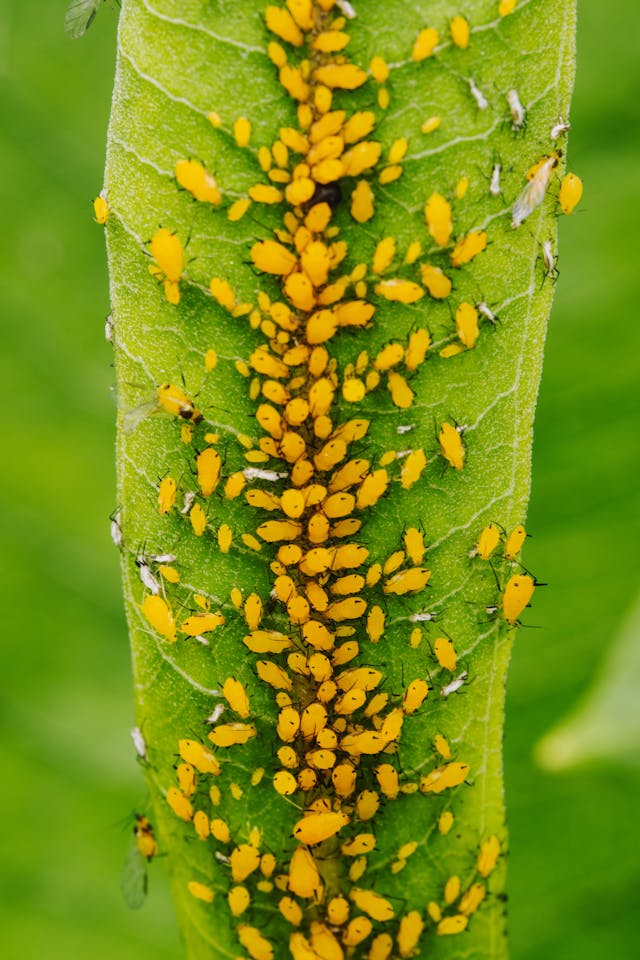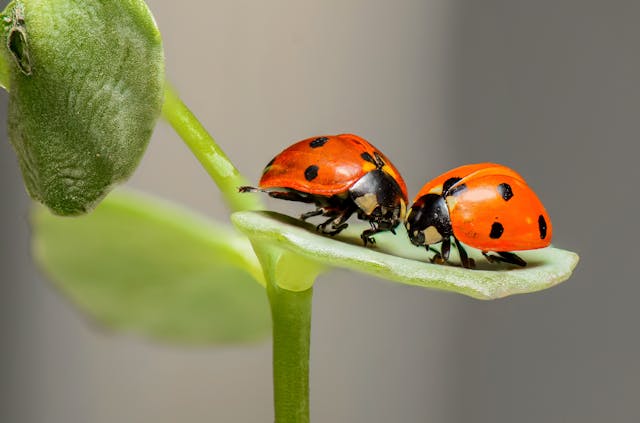
Tomato plants are cherished by gardeners for their vibrant colors, juicy fruits, and unmistakable taste. However, even the most robust plants can face challenges from pests like aphids. These tiny insects can wreak havoc on tomato plants, sucking out vital nutrients and weakening their defenses. But here’s the question on every gardener’s mind: Can tomato plants recover from aphids?
Aphids are notorious for their ability to multiply rapidly, colonizing plants in no time. These small, soft-bodied insects feed on the sap of plants, causing leaves to curl, turn yellow, and eventually wither. As they feed, aphids excrete a sticky substance called honeydew, which can attract ants and promote the growth of sooty mold.
But fear not, fellow gardeners, for nature has bestowed tomato plants with remarkable resilience. Despite the onslaught of aphids, tomato plants possess innate defenses that can aid in their recovery. From the production of toxic compounds to the enlistment of beneficial insects, tomato plants employ a variety of strategies to fend off these pesky invaders.
Furthermore, the resilience of tomato plants extends beyond mere defense mechanisms. With proper care and attention, afflicted tomato plants can bounce back from aphid infestations, regaining their vigor and vitality. Through strategic pruning, careful watering, and the application of natural remedies, gardeners can nurture their tomato plants back to health.
But the journey to recovery is not without its challenges. Gardeners must remain vigilant, monitoring their tomato plants closely for signs of aphid resurgence. Additionally, implementing preventative measures can help safeguard against future infestations, ensuring the long-term health and productivity of tomato plants.
So, to all the green-thumbed enthusiasts out there, take heart! While aphids may pose a threat to tomato plants, they are not invincible. With patience, perseverance, and a little bit of know-how, you can help your tomato plants overcome the odds and thrive once more. Stay tuned as we delve deeper into the fascinating world of tomato plant care and discover the secrets to a bountiful harvest.
Can Tomato Plants Recover from Aphids?
Yes, Tomato Plants can Recover from Aphids infestations with proper care and attention.
Aphids are small insects that feed on the sap of tomato plants, causing damage to leaves and stems. When left unchecked, they can weaken the plant and reduce yield.
How aphids affect tomato plants

Aphids can really do a number on tomato plants. These tiny pests have a big appetite for tomato foliage and love to suck out the plant’s sap, causing leaves to wilt and yellow.
Without intervention, aphids can multiply rapidly and completely cover a tomato plant, stunting its growth and reducing fruit production.
Aside from draining the tomato plant of essential nutrients, aphids also excrete a sticky substance called honeydew. This sugary residue can attract ants and mold, creating further issues for the already struggling tomato plant.
In addition, aphids can transmit viruses that can devastate an entire crop, making it crucial to address an aphid infestation promptly.
Identifying aphids on tomato plants
If you spot small, soft-bodied insects congregating on the undersides of your tomato plant leaves, chances are you’ve got yourself a group of aphids. These sneaky little pests come in various colors like green, yellow, or brown, and can sometimes be winged or wingless.
Don’t be fooled by their minuscule size; they multiply rapidly, forming colonies that can quickly take over your tomato plants if left unchecked.
Another telltale sign of aphids is the sticky residue they leave behind, known as honeydew. This sugary substance not only attracts ants but also promotes the growth of sooty mold, giving your tomato plants a black, sooty appearance.
Keep an eye out for distorted or yellowing leaves, as aphids extract vital nutrients from plants, causing stunted growth and reduced tomato yields.
The damage caused by aphids
Aphids may be small, but the damage they can wreak on tomato plants is significant. These tiny pests have piercing-sucking mouthparts that they use to feed on the sap of the plants.
As they suck out the sap, they can cause leaves to become distorted, yellowed, and stunted in growth.
Furthermore, aphids secrete a sticky substance known as honeydew, which can attract other insects like ants and encourage the growth of sooty mold on the plants.
This mold not only looks unsightly but can also hinder the plant’s ability to photosynthesize effectively, further weakening the tomato plant.
Recommended For effective organic pest control, give this product a try.
Natural predators of aphids

Ever noticed some tiny, colorful bugs busy feasting on aphids infesting your tomato plants? Chances are, those could be ladybugs or their larvae. Ladybugs are one of the most common natural predators of aphids, known for their voracious appetite for these pesky pests.
Their mere presence in your garden can help keep aphid populations in check, making them a valuable ally in your fight against these sap-sucking insects.
Another unsung hero in the battle against aphids is the lacewing. These delicate insects may not look like fierce hunters, but their larvae are fierce aphid predators.
With their large, sickle-shaped jaws, lacewing larvae can quickly decimate aphid populations, making them a beneficial addition to your garden ecosystem.
By attracting and supporting these natural predators, you can create a more balanced and harmonious environment that helps protect your tomato plants from aphid damage.
Preventing aphids on tomato plants
To keep those pesky aphids away from your precious tomato plants, it’s essential to start with good garden hygiene. Clear up any debris or weeds around your plants regularly to eliminate potential hiding spots for these tiny pests.
Aphids are attracted to weak plants, so make sure your tomatoes are healthy and well-fed to discourage infestations.
Another effective way to prevent aphids from taking over your tomato plants is to interplant them with companion plants that naturally repel aphids, such as marigolds or basil. These aromatic plants emit scents that aphids find unpleasant, helping to keep them at bay.
Additionally, rotating your tomato plants with other crops each season can disrupt aphids’ breeding patterns and reduce their chances of establishing a stronghold in your garden.
Using insecticidal soap to control aphids
For many gardeners, using insecticidal soap is an effective way to control aphids on tomato plants. This eco-friendly solution works by suffocating the aphids upon contact, making it a safe option for both plants and beneficial insects.
To apply insecticidal soap, make sure to cover both the tops and bottoms of the leaves where the aphids are present, as these pests like to hide in hard-to-reach areas.
When using insecticidal soap on tomato plants, it’s important to reapply it every few days or after rainfall to ensure continued effectiveness.
Be mindful of the weather conditions when applying the soap, as it is most effective when the temperature is below 90°F and there is no direct sunlight on the plants.
By incorporating insecticidal soap into your pest management routine, you can help keep aphids at bay and maintain healthy tomato plants throughout the growing season.
Recommended For effective organic pest control, give this product a try.
Pruning affected parts of tomato plants
If you spot aphids making themselves a cozy home on your tomato plants, pruning off the affected parts is a smart move.
Simply grab your gardening shears and snip away those infested leaves or stems. Remember, these pesky aphids love to hide on the underside of the leaves, so give those a closer look before making your cuts.
By getting rid of the areas where aphids like to hang out, you’re helping to stop them from spreading their buffet to other parts of your tomato plants.
Plus, pruning can also improve air circulation around your plants, which is a bonus for their overall health. So, don’t hesitate to do a little plant surgery if those aphids start causing trouble – your tomatoes will thank you for it!
Recommended In search of garden tools? Take a look at these offerings.
Introducing ladybugs to help with aphid control
Ladybugs, also known as ladybirds, are not just pretty insects to admire in the garden. They are actually powerful allies in the fight against those pesky aphids that love to infest tomato plants. These voracious little beetles have a big appetite for aphids and can quickly clean up an infestation.
By introducing ladybugs into your tomato garden, you are essentially bringing in a natural pest control team that can help keep aphid populations in check without the need for harmful chemicals.
These beneficial insects not only eat aphids but also their eggs, larvae, and even adult aphids, making them a valuable asset in maintaining the health of your tomato plants.
Applying neem oil as a natural remedy for aphids
Neem oil can be a game-changer when it comes to battling aphids on your beloved tomato plants. This natural remedy is derived from the seeds of the neem tree and works wonders in controlling aphid populations.
All you have to do is mix a small amount of neem oil with water and a drop of dish soap to help the solution stick to the leaves. Then, simply spray this concoction on the affected tomato plants, making sure to cover both the tops and bottoms of the leaves.
The beauty of using neem oil is that it not only repels aphids but also disrupts their growth and development. As a result, these pesky pests will have a hard time reproducing and causing further damage to your tomato plants.
Plus, neem oil is safe to use around beneficial insects like ladybugs, helping to maintain a balanced ecosystem in your garden. So the next time you spot aphids wreaking havoc on your tomato plants, consider giving neem oil a try to keep those critters at bay.
Recommended Check out this amazing natural neem oil for insect control in plants!
Using reflective mulch to deter aphids
Reflective mulch can be a handy tool in keeping those pesky aphids away from your beloved tomato plants.
The shiny surface of the mulch confuses the aphids and disrupts their navigation, deterring them from making your tomato plants their next feasting ground. It’s like giving them a mirror maze to navigate through, they just can’t find their way in, and that’s exactly what we want!
Not only does reflective mulch help in keeping aphids at bay, but it also aids in maximizing the sunlight that reaches your tomato plants. By reflecting more sunlight onto the lower leaves of the plants, reflective mulch promotes better photosynthesis, leading to healthier and more robust tomato plants.
So, not only are you deterring aphids, but you’re also giving your tomatoes a little extra sunshine boost – it’s a win-win situation!
Practicing crop rotation to prevent aphid infestations
Crop rotation is a smart gardening practice that can help keep those pesky aphids away from your precious tomato plants. By rotating your tomato plants with different crops each season, you disrupt the aphids’ breeding and feeding patterns, making it harder for them to establish themselves in your garden.
When you rotate your crops, you also help maintain the balance of nutrients in the soil, preventing the buildup of specific pests like aphids. Plus, changing up the location of your tomato plants can confuse the aphids, making it more challenging for them to find their favorite snack.
So, next time you’re planning your garden layout, keep crop rotation in mind as a natural way to ward off aphids and keep your tomato plants healthy and thriving.
Also Read – Can I Plant Zucchini Next To Tomatoes
Monitoring and maintaining healthy tomato plants
Keep an eye on your tomato plants regularly to catch any issues early on. Check the undersides of the leaves for aphids or any signs of damage like yellowing or curling. Make it a habit to water your plants at the base in the morning to prevent water from sitting on the leaves, which can attract pests like aphids.
To maintain healthy tomato plants, ensure they are getting adequate sunlight, at least six to eight hours a day. Prune off any yellowing or damaged leaves to promote air circulation and prevent the spread of diseases.
Maintaining a consistent watering schedule, keeping the soil moist but not waterlogged, will help your tomato plants thrive and be less susceptible to aphid infestations.
Recommended Take a look at this watering can.
FAQ
How do aphids affect tomato plants?
Aphids feed on the sap of tomato plants, causing stunted growth, yellowing leaves, and wilting. They can also spread diseases to the plants.
How can I identify aphids on my tomato plants?
Look for small, soft-bodied insects clustered on the stems and undersides of leaves. They can range in color from green to black.
What kind of damage do aphids cause to tomato plants?
Aphids can cause distortion of leaves, reduced yield, and the spread of diseases such as tomato mosaic virus.
Are there any natural predators of aphids?
Yes, ladybugs, lacewings, and parasitic wasps are all natural enemies of aphids and can help control their population.
How can I prevent aphids on my tomato plants?
Planting companion plants like marigolds, using row covers, and maintaining healthy soil can all help deter aphids.
How can I use insecticidal soap to control aphids on my tomato plants?
Spray the affected plants with insecticidal soap, making sure to cover both the tops and bottoms of the leaves.
Is pruning affected parts of tomato plants helpful in controlling aphids?
Yes, removing heavily infested parts can help prevent the spread of aphids to other parts of the plant.
How can introducing ladybugs help with aphid control?
Ladybugs are natural predators of aphids and can help reduce their population in your garden.
Can I use neem oil as a natural remedy for aphids on my tomato plants?
Yes, neem oil is an effective and organic way to control aphids. Just be sure to follow the instructions on the product label.
How can reflective mulch help deter aphids from my tomato plants?
Reflective mulch can confuse and deter aphids, making it harder for them to locate and infest your plants.
Why is practicing crop rotation important in preventing aphid infestations?
Aphids can overwinter in the soil, so rotating crops can help disrupt their life cycle and reduce their numbers in your garden.
How important is monitoring and maintaining healthy tomato plants in preventing aphids?
Regularly inspecting your plants for signs of aphids and maintaining healthy soil and plant care practices can help prevent aphid infestations and keep your tomatoes healthy.